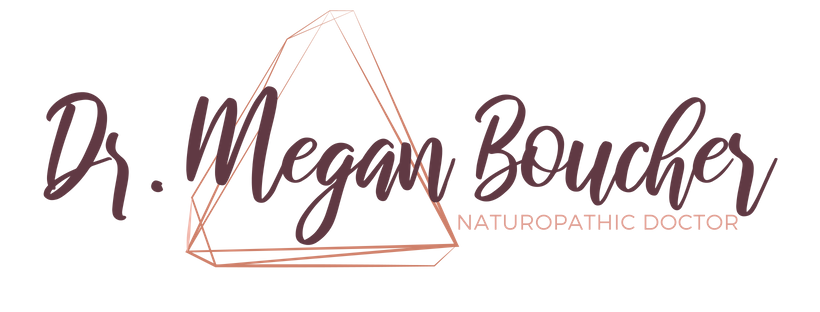Sometimes in my appointments with my Hypothyroid patients, I get strange looks… Let me explain. Ever heard of the Gut-Thyroid connection?
There’s a big difference between seeing a Naturopathic Doctor for your thyroid health and seeing an Endocrinologist or General Practitioner. Nine times out of ten, if you see a GP or Endocrinologist after being diagnosed with hypothyroidism, they focus on one thing.
Your thyroid.
Sure, it makes sense! You have a low functioning thyroid, so let’s just treat the thyroid, right?
Wrong!
So when I start asking my patients about their poop, past antibiotic use, bloating, and other fun digestive things, I get strange looks. Often this is because they aren’t used to being asked about other systems in their body when they have a thyroid issue (and for some reason, people don’t like talking about their poop). But my friends, our body doesn’t work in individual systems… Our body works as a whole; one big machine! So when I see dysfunction in one system, it is almost never isolated to just that one system (especially when the concerns have been going on for a long time).
Enter: The Gut-Thyroid Connection
The digestive system has a massive impact on the thyroid. Here are the top 5 ways your gut health may be impacting your thyroid health
Gut-Thyroid Connection #1: Breakdown & Absorption of Nutrients
The first, and maybe the most obvious way your gut can impact your thyroid is through the breakdown and absorption of nutrients. If you have read my previous article, The Top 5 Foods for Thyroid Support, you know that certain nutrients found in foods can support the proper production of thyroid hormone. In order to get those nutrients, we must first break down and absorb them – one of the primary roles of your gut!
This requires adequate stomach acid, digestive enzymes, and proper balance of gut bacteria. Certain nutrients can be tested for (iron, vitamin B12, iodine, selenium, folate, etc.) to get a better idea of your nutrient status, something I recommend before supplementing.
Gut-Thyroid Connection #2: Creation of Vitamins
Vitamins are nutrients that are vital (hence the vita- in vitamin) for our body to function. Vitamins (or their precursors) must be consumed through food or produced in our body by our trusty gut bacteria. These tiny microbes help us out by producing many of the B vitamins (including B12 and folate), as well as Vitamin K.
The B vitamins are needed for proper thyroid hormone production and conversion. Up to 40% of adults do not get enough B vitamins from their diet. If their gut is also imbalanced, their levels are likely going to be low, impacting their ability to produce and use thyroid hormones. Deficiencies in vitamin B1, B2, B5, B6, and B12 in particular can contribute to a low-functioning thyroid.
Gut-Thyroid Connection #3: Leaky Gut & Inflammation
A healthy gut is necessary for controlling inflammation. Your gut bacteria are responsible for regulating inflammation by promoting anti-inflammatory messengers and inhibiting pro-inflammatory chemicals. When your gut is not able to perform this function (due to an imbalance in bacteria, or leaky gut, for example), inflammation increases.
When inflammation increases, so does cortisol. High cortisol will down-regulate the conversion of T4 into T3, and increase the production of reverse T3 instead (you can read more about reverse T3 here).
(The connection with leaky gut and thyroid health becomes even more important when you also have Hashimoto’s. But that will require a whole other blog post)
Gut-Thyroid Connection #4: Conversion of T4 to T3
This is a problem I commonly see. Levels of TSH and free T4 are normal, while free T3 is on the low side (which is why it is important to not have only TSH and T4 tested). Your thyroid primarily produces T4, which must them be converted to T3 in… you guessed it… your gastrointestinal tract!
Healthy gut bacteria produce an enzyme called intestinal sulfatase which is needed for proper thyroid hormone conversion. Without this enzyme, your levels of T3 may be low. As we know, T3 is the hormone responsible for proper metabolism and energy production. So when this hormone is low, symptoms of hypothyroidism are common (even though you may be told everything is normal when only TSH and T4 are tested).
About 20% of conversion also happens in the liver. If your liver is being burdened by exposure to chemicals, pesticides, and other toxins, it has a harder time doing other tasks, such as giving you more T3. Often, I will include a gentle detox with my Hypothyroid patients to assist this process.
Gut-Thyroid Connection #5: Proper BM and elimination
Constipation is common in Hypothyroidism due to low thyroid hormone, which slows down the motility in our gut. Many of our hormones, such as estrogen, are eliminated through our bowel movements. When we are not eliminating properly, hormones can be re-absorbed, leading to an “estrogen-dominant” state. Estrogen dominance can impact the amount of free T3 available to do its job… Just a vicious cycle of constipation! Supporting proper bowel movements through diet, lifestyle, herbs, and certain nutrients can ultimately help balance your thyroid hormones.
Addressing gut health is paramount to making sure your thyroid is functioning at its best. If we just address the thyroid, we’re missing out on addressing one of the root causes! Want to explore your complete health, top to bottom? Feel free to reach out to me or book an appointment by following this link. Looking forward to working with you!

